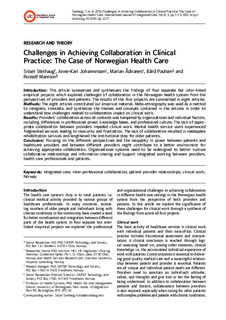Challenges in achieving collaboration in clinical practice: The case of Norwegian health care
Journal article, Peer reviewed
Permanent lenke
http://hdl.handle.net/11250/2589059Utgivelsesdato
2016Metadata
Vis full innførselSamlinger
Sammendrag
Introduction: This article summarizes and synthesizes the findings of four separate but inter-linked empirical projects which explored challenges of collaboration in the Norwegian health system from the perspectives of providers and patients. The results of the four projects are summarised in eight articles. Methods: The eight articles constituted our empirical material. Meta-ethnography was used as a method to integrate, translate, and synthesize the themes and concepts contained in the articles in order to understand how challenges related to collaboration impact on clinical work. Results: Providers’ collaboration across all contexts was hampered by organizational and individual factors, including, differences in professional power, knowledge bases, and professional culture. The lack of appropriate collaboration between providers impeded clinical work. Mental health service users experienced fragmented services leading to insecurity and frustration. The lack of collaboration resulted in inadequate rehabilitation services and lengthened the institutional stay for older patients. Conclusion: Focusing on the different perspectives and the inequality in power between patients and healthcare providers and between different providers might contribute to a better environment for achieving appropriate collaboration. Organizational systems need to be redesigned to better nurture collaborative relationships and information sharing and support integrated working between providers, health care professionals and patients.
